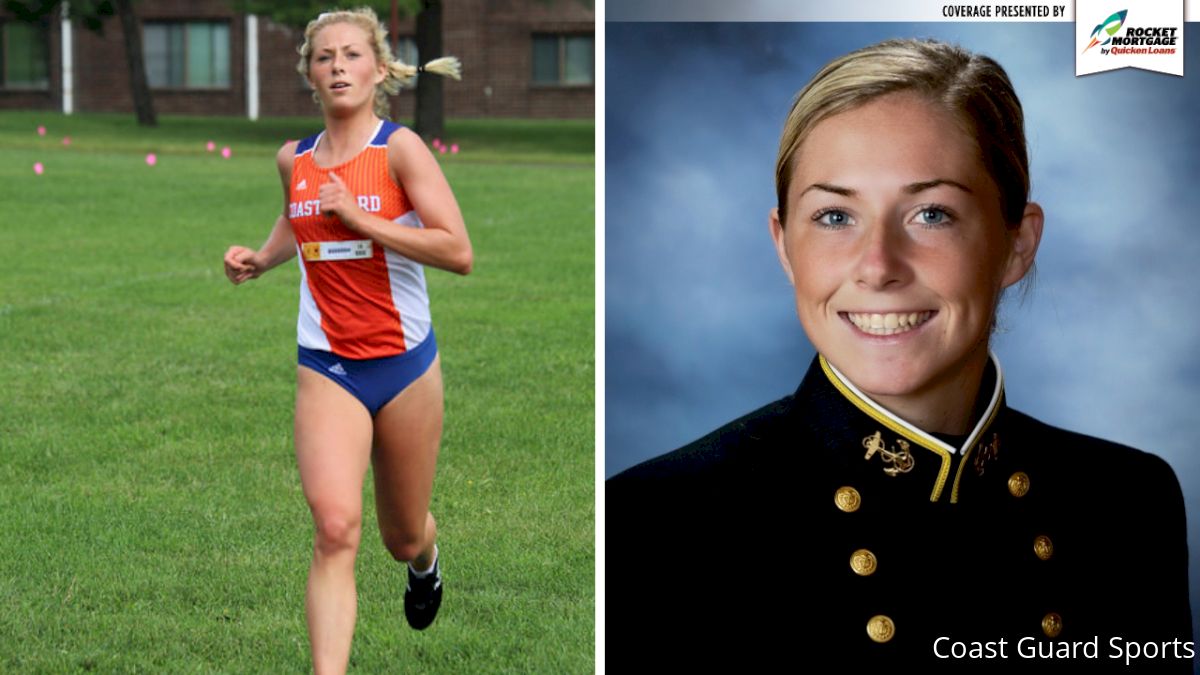Coast Guard's Kaitlyn Mooney Eyes NCAA History At DIII XC
Coast Guard's Kaitlyn Mooney Eyes NCAA History At DIII XC
Coast Guard's Kaitlyn Mooney can become the first female service academy athlete to win an NCAA XC title on Saturday.

When Coast Guard sophomore Kaitlyn Mooney crosses the finish line Saturday at the 2018 DIII NCAA XC Championships in Oshkosh, Wisconsin, there’s a very good chance she’ll have accomplished a feat that no other woman has in NCAA history.
A win by Mooney would be the first individual NCAA cross country title by a female from a service academy, and only the second overall after Air Force’s Michael Ryan won the DI race in 1968. It’s an exciting prospect for Mooney--who was fourth at NCAA XC as a freshman last year-- and not just because she has the chance to do something that’s never been done. The sophomore knows that a win would be particularly sweet given the rigors of her dawn-to-dusk routine as a cadet.
Good luck to Kaitlyn Mooney in her trip to the NCAA Cross Country Championships tomorrow in Colfax, WI‼️
— CGA Bears (@CoastGuardBears) November 16, 2018
Follow along ? -- https://t.co/SnUYtNfiGp#gocgabears ? pic.twitter.com/o3O8xkfWmv
“Sports aren’t our priority. We have so many other things that we have to do. That’d be really cool,” Mooney told FloTrack.
Being an elite collegiate distance runner at any school requires dedication and sacrifice, but it pales in comparison to the commitment required by a student-athlete at a service academy.
Mooney’s days are consumed with military training, lining up for formation with her fellow cadets, not to mention actual school work, which leaves a non-negotiable two-hour block each afternoon for her workouts. There’s no other option than for running to take a backseat.
Even so, Mooney chooses not to look at her unique circumstances as a disadvantage relative to her competition. Instead, she thinks of her day-to-day grind at the academy as a way for her to gain a mental edge on the course.
“I was talking to one of my teammates last week, and we were saying how sometimes it stinks we get a disadvantage, but at the same time it makes us stronger people,” she said. “Our competitors are not waking up at 6 o’clock to go to formation. They’re sleeping in.”
A toughness edge it may be, but there’s no sugar-coating the fitness constraints being a cadet can put on a runner.
During the summer, when most cross country athletes were putting in miles while relaxing at home, Mooney was splitting time in Boston on a cutter boat for three weeks. Then it was another six weeks in Hawaii as part of her Coast Guard obligations. She was still able to run, but her miles were limited given her hectic schedule throughout the day.
Mooney’s cross country training during crucial base-building months in July and August was often limited to 40-50 minutes ahead of a 6:45 AM work day start.
“I feel stronger this year, but it was tough to get training in over the summer,” she said. “When I was in Hawaii, that was also regimented because we were going along with the enlisted Coast Guard...It was tough getting training in then.”
In that regard, it’s even more remarkable what Mooney has done in her short time in the NCAA.
She won four races during her freshman year before taking top frosh honors last year at nationals in fourth, and she hasn’t missed a beat in her second season on the grass. Mooney will race on Saturday with another four wins under her belt in 2018, including an impressive 20-second victory last weekend in 20:43 at the New England regional.
For the 2️⃣nd year in a row, Mooney is your New England Division III Champion? The 1️⃣st place finish in yesterday’s race, guarantees her a spot to compete in the National Championships! #gocgabears pic.twitter.com/8WG4jewS8G
— CGA Bears (@CoastGuardBears) November 11, 2018
That race in particular has Mooney feeling confident heading into nationals, where she will likely find herself battling Johns Hopkins senior Ellie Clawson for the national title. Clawson and Mooney are the top two returners from 2017, and they finished just a second apart in their battle a year ago.
Neither Mooney or her coach Greg Ahnrud are going in with a singular focus on win or bust, but both know just how tremendous of an accomplishment it would be for a Coast Guard athlete to take a national title in just her second year in DIII.
“I don’t think I could overstate how huge that would be. Both from drawing awareness to our program, to the school, it’d be huge,” said Ahnrud.
“She had plenty of options coming out of high school, and so I think this would kind of help confirm for her on the athletic side of things that this was a really good choice.”